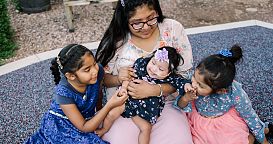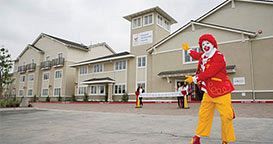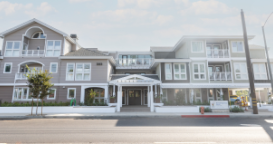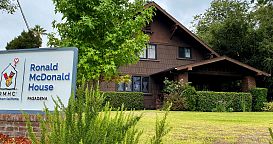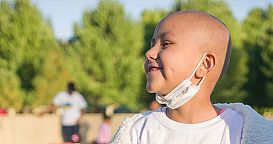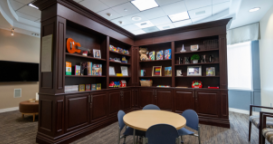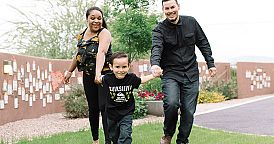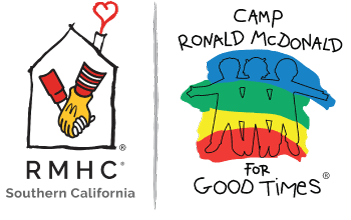
Drake Muir was just 11 years old when he was diagnosed with Anaplastic Large Cell Lymphoma, with his diagnosis arriving directly on the heels of another landmark moment for his family – the death of his grandfather.
According to his mother Jeanne, "Grant’s (Drake’s father’s) dad died on a Thursday, and the next day, Drake was in the hospital with a lymph node infection." With lymph nodes the size of baseballs, Drake was initially treated with a course of antibiotics. Shortly afterward, however, a biopsy revealed that his lymph nodes were indeed enlarged by cancer.
Following his April diagnosis, Drake began treatment at City of Hope. Treatment threw his life before the diagnosis into sharp relief, since Drake was required to spend 15 months in isolation. Cancer treatment compromises the immune system, thereby making isolation a medical necessity for many patients.
Once it was safe for him to emerge from quarantine, a City of Hope nurse encouraged Drake to attend Camp Ronald McDonald for Good Times. Jeanne says that she and Grant were nervous at first, but felt better when they learned that Drake’s sister Lily could attend that first summer session with him. They drove Drake and Lily up to Camp’s site in Mountain Center themselves, and upon arrival, they were immediately reassured by the warmth and care with which counselors introduced themselves. And when they arrived back on the mountain to bring Drake and Lily home, the Muirs could see that their two eldest children were exhausted but happy.
In the years that followed, Drake and Lily were always excited to return to Camp. While at Camp, Jeanne says, Drake appreciated not being known as "the kid with cancer." Their younger brother Nick would join them up at Camp once he turned 9, but in the years leading up to that, Jeanne and Grant also appreciated how Camp gave them a chance to provide their youngest child with one-on-one attention. Jeanne describes Drake as "a quieter soul," but noticed that Camp nurtured his self-confidence. As a teen enrolled in Camp’s Wilderness Outdoor Leadership Program (W.O.L.P.), for example, Drake shared with Jeanne that he spoke Spanish with a fellow camper who didn’t know English.
In 2019, after many years in remission, Drake relapsed. Repeating chemotherapy was not a safe option at that time, so instead, Drake underwent a bone marrow transplant and a full year of immunotherapy. Today, however, he’s well and thriving. After working at a Central Coast golf club for seven years, he was promoted to Assistant Superintendent. Most recently, he set off touring the United States with his girlfriend, after having helped Lily move into her new home in Connecticut.
For the last five years, Lily has served as a counselor. Her Camp name is now "Plankton," because while a graduate student at the University of Rhode Island, she built the Plankton Sampler – a deep-sea autonomous robot. "I definitely grew up at Camp," she states, "and Camp supported my growth at each stage of my development." Lily shares that climbing the tower in Camp’s Chandler Courage Course empowered her while participating in W.O.L.P. set her on a path to discover her leadership ability. When deciding to return to Camp as a counselor, Lily even recalled the value that Camp places on "challenge by choice" - a concept that centers on encouraging kids to make decisions on their own, without an adult or peer pressure.
NOW 29 YEARS OF AGE, Drake concurs that Camp helped him open up to others. He states, “It can be challenging to acclimate to social life when you’re undergoing treatment, but Camp did that for me.” Drake also shares that although undergoing treatment as a child made him feel “different” from his peers, Camp helped him realize that everyone has problems.
Today, Nick is majoring in business at Cal Poly San Luis Obispo, where he is also a senior. In reflecting on his time at Camp, he appreciates how it served as a much-needed getaway where he could interact with other children who were also experiencing childhood cancer. "You can never give back (to Camp) enough," he says, which is why, like Lily, he also decided to become a counselor. For him, Camp was a unique, one-of-a-kind experience that also shaped his life.
Jeanne and Grant give back to Camp, too, as longtime donors. In reflecting back on her family’s journey, Jeanne affirms that a childhood cancer diagnosis marks "a critically scary time in your life." Through all of that, however, Camp’s impact on each of their lives has been great. She shares that they continue to support Camp because they see the value it provides for others. "Unless you’ve been there," Jeanne says of the experience of pediatric cancer, "you don’t know what it is like. You’re looking for a lifeline, and there’s so much value in the support that Camp provides." And for that, the Muirs simply want other families to have the same opportunity they had to grow and heal.
